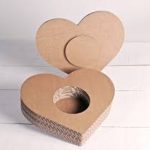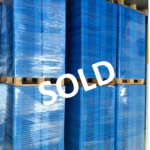Stocks of wafer packaging canisters (150, 200 & 300mm) and metal as well as plastic rings (200 & 300 mm) are available for sale. Please send your enquiries to enquiry@leecycleresources.sg
Canisters


Metal & Plastic Rings


Stocks of wafer packaging canisters (150, 200 & 300mm) and metal as well as plastic rings (200 & 300 mm) are available for sale. Please send your enquiries to enquiry@leecycleresources.sg
Canisters


Metal & Plastic Rings


For a recycling program to work, a substantially large, stable supply of recyclable material is necessary both economically and value creation. Three legislative options have been used to create such a supply: mandatory recycling collection, container deposit legislation, and refuse bans.
Mandatory collection laws set recycling targets for cities whereby a certain percentage of a material must be diverted from the city’s waste stream by a target date. The city is then responsible for working to meet this target. Container deposit legislation involves offering a refund for the return of certain containers, typically glass, plastic, and metal. When a product in such a container is purchased, a small surcharge is added to the price. This surcharge can be reclaimed by the consumer if the container is returned to a collection point.
These programs have been very successful, often resulting in an 80 percent recycling rate. Despite such good results, the shift in collection costs from local government to industry and consumers has created strong opposition to the creation of such programs in some areas. A variation on this is where the manufacturer bears responsibility for the recycling of their goods. In the European Union, the waste electrical and electronic equipment (WEEE) Directive requires producers of consumer electronics to reimburse the recyclers’ costs. In the Asian sphere, industries tend to pass the cost to recycling companies requiring them to submit bids for industrial scraps. In many cases, this approach gets to be mercenary where recyclers are pushed to submit higher and higher bid prices to collect the industrial scraps. This meant that collection of industrial recyclable wastes (electronics, plastics, paper, metals, etc.) has become an added profit making activity of manufacturers and industrial users contrary to a globally shared desire to conserve fossil fuels and encourage recycling to reduce industrial wastes, landfills and ozone depletion.
An alternative way to increase supply of recyclates is to ban the disposal of certain materials as waste, often including used oil, old batteries, tires, and garden waste. One aim of this method is to create a viable economy for proper disposal of banned products. Care must be taken that enough of these recycling services exist, or such bans simply lead to increased illegal dumping. The same problem of making profit out of industrial scraps is also inherent and prevailing here. It would do well for governments to legislate to prevent capitalizing on sale of industrial scraps and, perhaps, even compel industries to aid in the recycling efforts by reducing the cost of scraps collection for recyclers. State incentives for businesses that reduces the scrap collection costs to zero could be a further initiative for the national recycling activity.
[Please look out for our next instalment of knowledge based article on Government-mandated Demand.]
The company has successfully acquired the ISO 9001:2015 latest certification after a thorough study of all work processes including safety and risk management factors. A successful internal audit followed by a stringent external audit culminated in the awarding of the ISO certificate. The certificate is proudly displayed at the company premises and in various company documentation.

Semi-conductor companies in Singapore periodically scrap their wafer and integrated circuit packaging that includes plastic boxes and trays as well as some plastic materials (polystyrene, polypropylene, polycarbonate, etc.) that are either originally produced from fossil oils or crushed from packaging items. For the collection of these scraps, there is no need for an National Environment Agency (NEA) license.
Strangely, a number of companies continue to ask for an “NEA waste collection license”. It is known that many scraps collector produced the NEA General Waste License and this is accepted by the companies. In truth, this particular license is not exactly appropriate or relevant to the collection of industrial plastics, in fact, it is the license to collect kurb-side (general public waste) scraps that includes all kinds of discarded plastic waste (brooms, hangers, boxes, mats, kitchen utensils, etc. etc.)
For the collection of industrial plastics there is no need to have an NEA license as there is no such license. This can be easily confirmed by checking with NEA.
Then again, when semi-conductor companies wanted to get rid of steel shelves and other forms of containers associated with wafer fabrication, the NEA General Waste Collector License is also irrelevant and superfluous. As these metallic items are not the core business of semi-conductor or other industrial plants, they can be collected by the contracted plastic scraps collector provided the metals are passed onto to accredited metal recycler and certification from the recycler is shown as proof of proper disposal. Where metals contain toxicity such as aluminium sheets, the recycler ought to have the NEA Toxic Waste license.
The company has a vacancy for a general worker whose duties would include sorting and packing work. The person will be taught the work process for sorting, packing and stacking of plastic material (boxes, trays, etc.). Additionally the person will also be taught the use of pallet jack (see image).
The standard work benefits are applicable and make available to the successful applicant. The job is opened to either male or female person. The work environment is a warehouse in the Tampines industrial area near Ikea and Giant supermart. Interested persons, please send in your request and personal data to enquiry@leecycleresources.sg.





Once again we have numerous 44-gallons metal drums in blue and white colors. These drums were originally made to contain liquid silicone rubber but are now emptied and ready for re-use.
If interested, please send an email to enquiry@leecycleresources.sg



These parts are available for SEP MW 300GT-A FOSB (front opening shipping box):

Top Robotic Flange

Manual Handle

Carton boxes collected by Lee Cycle Resources from the industries are usually corrugated fiber-board sometimes known as corrugated board or corrugated cardboard. This is usually a combined paper-based material consisting of a fluted corrugated medium and one or two flat liner boards.
Food For Thought – An Art Escapade for the Carton Box?
While technology is frequently devising new ways of doing things, re-use of carton boxes stubbornly remains the same – that is, for packaging purposes by household movers and in the other case, toss to recycling into pulp for industrial use.
How about up-cycling these carton boxes? Given a little more thought, the possibilities are almost endless. Carton boxes can be cut, bent, painted, wrapped and configured in almost any way you can imagine. If you have some artistic talent, you can transform the simple carton box into useful toys, storage containers and many artistic objects or other functional household items.
If you want to buy carton boxes, please drop an email to enquiry@leecycleresources.sg

Polypropylene (PP), also known as polypropene, is a thermoplastic polymer used in a wide variety of applications including packaging and labelling, textiles (e.g. ropes, thermal underwear and carpets), stationery, plastic parts and reusable containers of various types, laboratory equipment, loudspeakers, automotive components, and polymer banknotes. An addition polymer made from the monomer propylene, it is rugged and unusually resistant to many chemical solvents, bases and acids.
We have SOLD this PP stock. If you need more PP stock, please drop us an email at enquiry@leecycleresources.sg

FOSB are specialized containers for transferring wafers from one manufacturing facility to another. The 25 wafer capacity, front opening shipping box (FOSB) is used to transport wafers from one wafer supplier to wafer fabs and between wafer fab facilities. FOSBs can be returned to the fabs suppliers for reuse. On composition interest, the boxes are mainly made of PC (polycarbonate) with insulation parts made of PBT (Polybutylene terephthalate).
We have substantial amount of FOSBs that can be cleanse for reuse or recovered as material. For enquiry, please drop us an email at enquiry@leecycleresources.sg